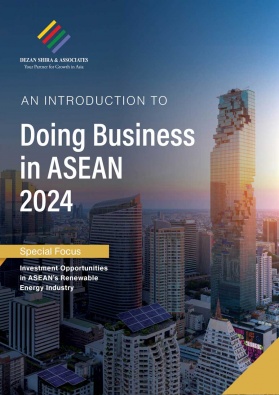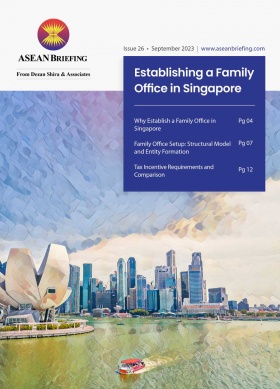Singapore Increases Goods and Sales Tax for 2024
Singapore has increased its goods and sales tax (GST) rate by one percent to nine percent as of January 1, 2024.
GST is a value-added tax levied on most supplies of goods and services as well as on imported goods.
Why is Singapore increasing its GST levy?
Singapore announced planned GST increases during the 2022 budget with the rate raised in two steps, from seven to eight percent in 2023, and eight to nine percent in 2024. The revenue received from the increase in GST will be used to cover the country’s medium-term needs.
The steady tax increase showcases Singapore’s need to shore up its tax revenue base, especially as healthcare costs continue to rise in the city-state. The government designated an estimated US$12 billion for healthcare in the 2023 budget, triple to what was designated 10 years ago. Further, Singapore is expected to spend S$59 billion (US$44.7 billion) on healthcare by 2030.
An aging population
Singapore’s healthcare expenditure is rising significantly due to its rapidly aging population. Today, 1 in 7 Singaporeans are aged 65 and above. By 2030, this is expected to be 1 in 40, or approximately one-quarter of the population.
How should GST-registered businesses prepare for the increase?
GST-registered businesses are advised to prepare as soon as possible for the upcoming rate change. Some areas that businesses should address include:
- Updating their accounting and invoicing systems to accommodate for the new GST rate;
- Updating any pricing schedules made available to customers and the public, such as on websites;
- Updating their cash register systems;
- Review contracts and agreements with suppliers or customers to accommodate the new rate;
- Equip employees with the relevant GST knowledge so that they are aware of its impact; and/or
- Seek the help of professional advisors who can assist in applying for any relevant GST schemes from the government.
Cost-of-living-package
Singapore’s Ministry of Finance unveiled a new cost-of-living package in September 2023 to provide more relief for Singaporean households, especially lower- to middle-income families. The support package introduces a range of cash payments, vouchers, and subsidy schemes.
What was included in the support package?
Enhancements to Assurance Package
The support package will include an SG$800 million (US$588 million) enhancement to the Assurance Package (AP), which will bring it to over SG$10 billion (US$7.4 billion).
The AP is a support scheme first introduced in 2020 to cushion citizens from the impact of the GST hike.
Under the AP, all Singaporean citizens aged 21 and above are eligible for yearly cash payments between SG$700 (US$514.7) and SG$2,200 (US$1,617.6), paid over the years from 2022 to 2026. The amount each citizen receives depends on their assessable income and property ownership.
Under the new support package, eligible Singaporean citizens aged 21 will receive an additional cash payment of either SG$150 (US$110.3) or SG$200 (US$147), depending on assessable income and property ownership (called the AP Cash Special Payment).
As this additional payment is not available to those with an annual assessable income of over S$100,000 (US$73,527) or who own more than one property, the 2023 COL Special Payment is targeted at middle and lower-income households.The additional payment will be disbursed in December 2023 along with the existing AP cash payments, which means around 2.5 million eligible citizens will receive payments of up to SG$800 (US$588) at this time.
The 2023 Budget already announced an additional one-off cost-of-living (COL) payment of between SG$200 and SG$400 (US$294) for eligible citizens aged 21 and up (called the 2023 COL Special Payment), a continuation of a payment first introduced in 2022.
CDC vouchers
Another enhancement to the AP is an SG$200 increase in the value of the Community Development Council (CDC) vouchers available for Singaporean households in 2024. The CDC voucher scheme, which has been implemented since 2021, provides spending vouchers for all Singaporean households, which can be used on goods and services provided by:
- Participating supermarkets; and
- Participating in hawker stalls and heartland merchants.
The 2022 Budget initially announced SG$200 in CDC vouchers for all households in 2023 and 2024. An additional SG$100 (US$73.5) in CDC vouchers was then announced for 2023 and 2024 (in the 2022 Cost-of-Living package and Budget 2023 respectively).
The support package has now announced an additional SG$200 in CDC vouchers for 2024, bringing the total value of CDC vouchers available next year to SG$500 (US$367.6).
The additional vouchers will be allocated equally across the two providers; that is, SG$100 can be spent at participating hawker stalls and heartland merchants, and SG$100 at participating supermarkets.
The previous SG$300 (US$220.6) in CDC vouchers will also be split equally with SG$150 allocated to each type of provider.
Households can claim the vouchers online from January 3, 2024, and must be used before the end of the year.
Additional service and conservancy charges rebate
The support package provides an additional half-month service and conservancy charges (S&CC) rebate for 950,000 Housing & Development Board (HDB) households. HDB households are households that live in so-called HDB flats, public housing provided by the HDB. As of 2023, around 80 percent of all Singaporean residents live in HDB flats, of which around 90 percent are occupant-owned.
The S&CC are monthly maintenance fees charged to residents of HDB flats. The government introduced S&CC rebates in 2012 as part of its “Grow and Share” package. It was made a component of the permanent Goods and Services Tax Voucher (GSTV) scheme in the 2022 Budget.
In 2023, HDB households are eligible for between 1.5 and 3.5 months of S&CC rebates, depending on the size of the HDB flat.
In June 2023, it was announced that all town councils run by the People’s Action Party (PAP), constituting 15 of Singapore’s 17 town councils, will raise S&CC for all HDB residents, shops, offices, markets, and food stalls from July onward.
The additional half-month S&CC rebate provided in the support package will help to offset the impact of the higher S&CC for these households. According to the MOF, on average, the additional rebate will fully offset the S&CC increase in the first year of increases for one- to four-room HDB flats, and about 85 percent for larger HDB flats.
The additional S&CC rebate will be disbursed in January 2024 along with the existing rebates.
Additional U-Save rebates
In addition to the S&CC rebate, an additional SG$20 (US$14.7) will be provided per quarter in U-Save rebates between January 2024 and December 2025. The GSTV U-Save is a rebate provided to middle- and low-income households living in HDB flats to offset utility expenses, paid out four times a year. As with the S&CC rebate, it was first introduced in 2012.
According to the MOF, these additional U-Save rebates will help cushion the impact of the increase in carbon tax and water prices in 2024 and 2025. Specifically, over these two years, the additional U-Save rebates will, on average:
- Fully offset the increase in utility bills for one-room flats
- Offset about 80 percent in utility bills for three-to-four-room HDB flats; and
- Offset about 65 percent in utility bills for larger flats.
On average, this means three-to-four-room HDB flats will pay about SG$2 (US$1.47) more per month, and flats with five or more rooms will pay about SG$4 (US$2.94) more per month.
About Us
ASEAN Briefing is produced by Dezan Shira & Associates. The firm assists foreign investors throughout Asia and maintains offices throughout ASEAN, including in Singapore, Hanoi, Ho Chi Minh City, and Da Nang in Vietnam, in addition to Jakarta, in Indonesia. We also have partner firms in Malaysia, the Philippines, and Thailand as well as our practices in China and India. Please contact us at asean@dezshira.com or visit our website at www.dezshira.com.
- Previous Article An Introduction to Doing Business in ASEAN 2024 – New Publication from Dezan Shira & Associates
- Next Article







